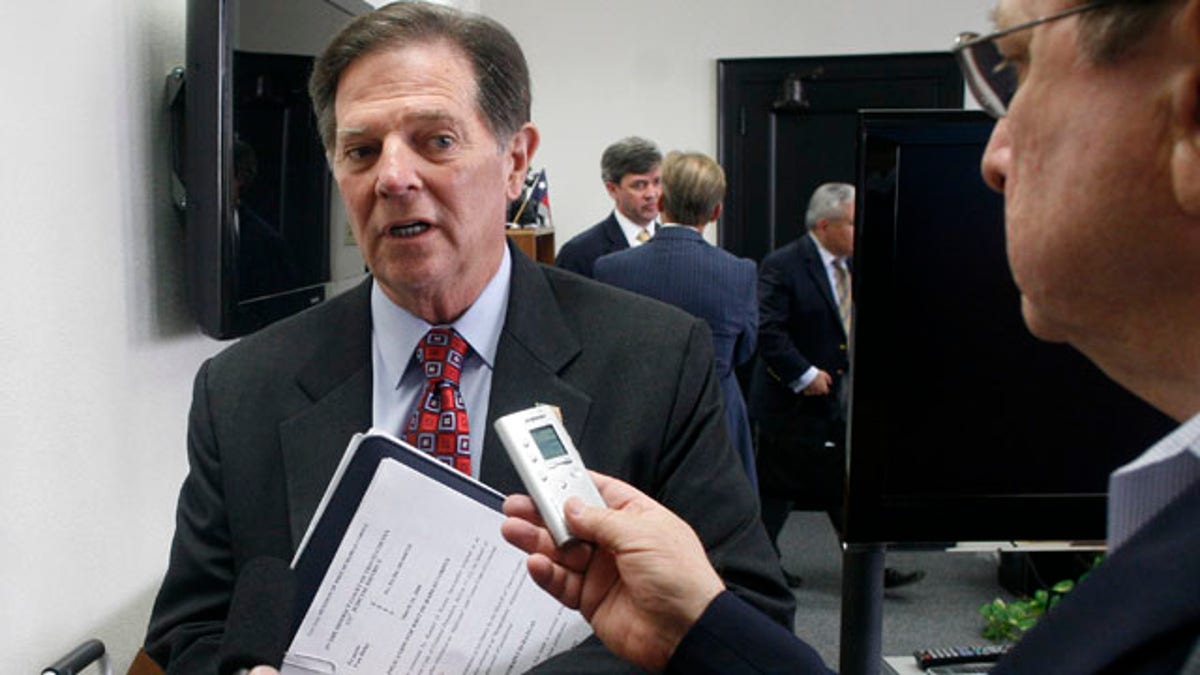
Oct. 26, 2010: Former House Majority Leader Tom Delay answers media questions during a break in jury selection for his money laundering and conspiracy trial. (AP)
Former U.S. House Majority Leader Tom DeLay -- once one of the most powerful and feared Republicans in Congress -- was convicted Wednesday on charges he illegally funneled corporate money to Texas candidates in 2002, which could send him to prison for decades.
Jurors deliberated for 19 hours before returning guilty verdicts on charges of money laundering and conspiracy to commit money laundering in a scheme to illegally funnel corporate money to Texas candidates in 2002. He faces up to life in prison on the money laundering charge, although prosecutors haven't yet recommended a sentence.
After the verdicts were read, DeLay hugged his daughter, Danielle, and his wife, Christine. DeLay whispered into his daughter's ear that he couldn't get a fair trial in Austin. DeLay had unsuccessfully tried to get the trial moved out of Austin, the most liberal city in one of the most Republican states
DeLay's lead attorney, Dick DeGuerin, said they planned to appeal the verdict.
"This is an abuse of power. It's a miscarriage of justice, and I still maintain that I am innocent. The criminalization of politics undermines our very system and I'm very disappointed in the outcome," DeLay told reporters outside the courtroom.
He remains free on bond, and several witnesses were expected to be called during the punishment phase of his trial, tentatively scheduled to begin on Dec. 20.
Prosecutors said DeLay, who once held the No. 2 job in the House of Representatives and whose tough tactics earned him the nickname "the Hammer," used his political action committee to illegally channel $190,000 in corporate donations into 2002 Texas legislative races through a money swap.
DeLay and his attorneys maintained the former Houston-area congressman did nothing wrong as no corporate funds went to Texas candidates and the money swap was legal.
The verdict came after a three-week trial in which prosecutors presented more than 30 witnesses and volumes of e-mails and other documents. DeLay's attorneys presented five witnesses.
"This case is a message from the citizens of the state of Texas that the public officials they elect to represent them must do so honestly and ethically, and if not, they'll be held accountable," Travis County District Attorney Rosemary Lehmberg said after the verdict.
Lehmberg said prosecutors will decide in the next few weeks what sentence they will recommend in the case to Senior Judge Pat Priest.
DeLay chose Priest to sentence him rather than the jury. He faces five years to life in prison on the money laundering charge and two to 20 years on the conspiracy charge. He also would be eligible for probation.
Jurors, who left the courthouse right after the verdict was read, declined to comment to reporters, only saying that it had been a tough decision for them to make.
The jury had sent numerous notes to Priest during its deliberations, which began on Monday. Many of the notes asked various legal questions that at one point had prompted the judge to say the panel wasn't on the right track. But at the end of Tuesday, jurors had indicated they were making progress.
Prosecutors said DeLay conspired with two associates, John Colyandro and Jim Ellis, to use his Texas-based PAC to send $190,000 in corporate money to an arm of the Washington-based Republican National Committee, or RNC. The RNC then sent the same amount to seven Texas House candidates. Under Texas law, corporate money can't go directly to political campaigns.
Prosecutors claim the money helped Republicans take control of the Texas House. That enabled the GOP majority to push through a Delay-engineered congressional redistricting plan that sent more Texas Republicans to Congress in 2004 -- and strengthened DeLay's political power.
DeLay's attorneys argued the money swap resulted in the seven candidates getting donations from individuals, which they could legally use in Texas.
They also said DeLay only lent his name to the PAC and had little involvement in how it was run. Prosecutors, who presented mostly circumstantial evidence, didn't prove he committed a crime, they said.
DeLay contended the charges against him were a political vendetta by Ronnie Earle, the former Democratic Travis County district attorney who originally brought the case and is now retired.
Lehmberg, who replaced Earle, said the trial was not about criminalizing politics.
"This was about holding public officials accountable, that no one is above the law and all persons have to abide by the law, no matter how powerful or lofty the position he or she might hold," she said.
Craig McDonald, the director of Texans for Public Justice, a liberal watchdog group whose complaints with the Travis County District Attorney's Office helped lead to the investigation of DeLay's PAC, said he was pleased by the verdict.
"We can't undo the 2002 election, but a jury wisely acted to hold DeLay accountable for conspiring to steal it."
The 2005 criminal charges in Texas, as well as a separate federal investigation of DeLay's ties to disgraced former lobbyist Jack Abramoff, ended his 22-year political career representing suburban Houston. The Justice Department probe into DeLay's ties to Abramoff ended without any charges filed against DeLay.
Ellis and Colyandro, who face lesser charges, will be tried later.
Except for a 2009 appearance on ABC's hit television show "Dancing With the Stars," DeLay has been out of the spotlight since resigning from Congress in 2006. He now runs a consulting firm based in the Houston suburb of Sugar Land.











































